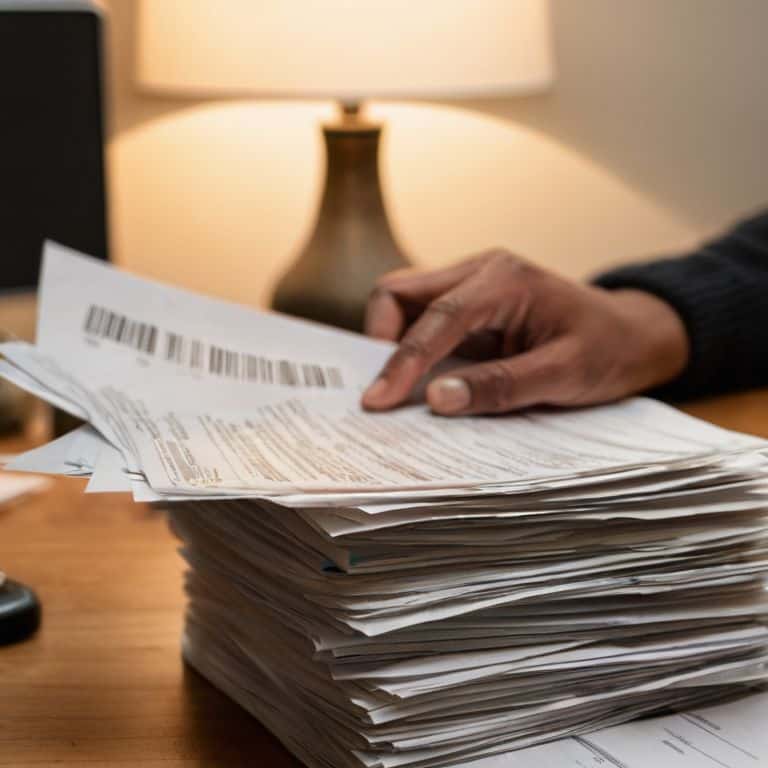I still remember the anxiety I felt when I first had to deal with collection agencies. It was like being lost in the wilderness without a map, not knowing which step to take next. But, as someone who’s passionate about budgeting for long-distance hikes, I’ve learned that even in the most uncertain terrain, there’s always a way forward. The common myth is that dealing with collection agencies is a daunting, complicated process, but I’m here to tell you that it doesn’t have to be. In fact, how to deal with collection agencies can be broken down into simple, manageable steps.
As we navigate this journey together, I promise to provide you with practical advice and honest guidance on how to tame the chaos of collection agencies. You’ll learn how to communicate effectively, understand your rights, and create a plan to regain control of your finances. My goal is to empower you with the knowledge and confidence to handle these situations with ease, so you can focus on what truly matters. In this article, we’ll take it one step at a time, and by the end of it, you’ll be well on your way to finding peace of mind and financial wellness.
Table of Contents
Guide Overview: What You'll Need

Total Time: several hours over several days
Estimated Cost: $0 – $100
Difficulty Level: Intermediate
Tools Required
- Computer (with internet connection)
- Phone (for calls to collection agencies)
- Calculator (for budgeting and payment planning)
- Pen and Paper (for note-taking and record-keeping)
Supplies & Materials
- Envelope and Stamp (for mailing dispute letters or payment plans)
- Copies of Financial Documents (for verification and reference)
- Calendar (for tracking deadlines and follow-ups)
Step-by-Step Instructions
- 1. First, take a deep breath and acknowledge that dealing with collection agencies can be a stressful experience, but it’s essential to approach the situation with a clear mind. Start by gathering all the relevant information, including the debt amount, the creditor’s name, and any correspondence you’ve received from the collection agency. Make sure to keep all the documents in a safe and accessible place, like a dedicated folder or a secure online storage service.
- 2. Next, review your budget and understand your financial situation. Make a list of your income, expenses, and any existing debts. This will help you determine how much you can afford to pay towards the debt. Be honest with yourself, and don’t forget to include any essential expenses, like rent/mortgage, utilities, and food. Remember, the goal is to find a sustainable solution that works for you, not to put yourself in a tighter financial spot.
- 3. Now, verify the debt by requesting a validation notice from the collection agency. This is a crucial step, as it ensures that the debt is legitimate and that you’re not being scammed. The notice should include the debt amount, the original creditor’s name, and a clear explanation of the debt. If the collection agency is unable to provide this information, you may be able to dispute the debt.
- 4. Once you’ve verified the debt, it’s time to prioritize your payments. Make a list of all your debts, including the one with the collection agency, and sort them by interest rate and urgency. Focus on paying off the high-interest debts first, while still making minimum payments on the others. This approach will help you save money on interest and become debt-free faster.
- 5. When communicating with the collection agency, stay calm and assertive. Remember that you’re in control, and it’s essential to maintain a professional tone. Avoid making promises you can’t keep, and don’t agree to any payment plans that you’re not comfortable with. Instead, focus on finding a mutually beneficial solution that works for both you and the collection agency.
- 6. If you’re unable to pay the full debt amount, consider negotiating a settlement. This can be a good option if you have a lump sum of money available, but be careful not to compromise your financial stability. Make sure to get any agreement in writing, and review the terms carefully before signing. A good rule of thumb is to aim for a settlement that’s less than 50% of the original debt amount.
- 7. Finally, automate your payments to ensure that you’re making timely payments and avoiding any additional fees. Set up a payment plan with the collection agency, and make sure to review your budget regularly to ensure that you’re on track to becoming debt-free. Remember, the key to success is to stay consistent and patient, and to focus on making progress, rather than perfection.
Taming Collection Agency Chaos

As you navigate the process of dealing with collection agencies, it’s essential to understand the debt validation procedures that are in place to protect you. This means knowing your rights and being aware of the laws that govern debt collection. Communicating with debt collectors can be intimidating, but it’s crucial to stay calm and assertive. Remember, you have the right to dispute any debt collection claims that you believe are incorrect or unfair.
When negotiating a debt settlement plan, it’s vital to have a clear understanding of your financial situation and what you can realistically afford to pay. Avoiding debt collection scams is also crucial, as some unscrupulous collectors may try to take advantage of you. Be wary of any collectors who demand immediate payment or threaten to take legal action.
By being informed and prepared, you can take control of the situation and work towards a resolution. Negotiating debt settlement plans can be a complex process, but it’s often possible to reach a mutually beneficial agreement. Remember to stay focused on your goals and don’t be afraid to seek help if you need it. With patience and persistence, you can tame the chaos of debt collection and move forward with confidence.
Negotiating Settlements With Ease
When negotiating settlements, remember that collection agencies are often willing to accept less than the full amount owed. This is because they’ve likely purchased your debt for a fraction of its original value. Approach the conversation calmly and clearly state your proposed settlement amount. Be prepared to provide financial information to support your offer, but don’t feel obligated to reveal more than necessary.
I recommend starting with a lower offer and being open to compromise. For example, if you owe $1,000, you might offer $600. The agency may counter with $800, and you can work from there. Stay focused on your target amount and don’t be swayed by aggressive tactics. Remember, negotiating a settlement is a normal part of the process, and it’s okay to advocate for yourself.
Understanding Debt Collection Laws
As we navigate the complex world of debt collection, it’s essential to understand the laws that govern this process. The Fair Debt Collection Practices Act (FDCPA) is a federal law that protects consumers from abusive and deceptive practices by debt collectors. This law regulates how collection agencies can communicate with you, including restrictions on contact times, methods, and content. For instance, debt collectors cannot call you before 8 am or after 9 pm, and they must provide you with written notice of the debt, including the amount and the creditor’s name.
By familiarizing yourself with the FDCPA, you’ll be better equipped to recognize and report any unlawful behavior by collection agencies. This knowledge is a powerful tool in managing debt collection and reducing stress. Remember, you have rights, and understanding these laws can help you assert them and regain control over your financial situation.
5 Mindful Moves to Master Collection Agency Interactions
- Stay calm and don’t engage with aggressive collectors – you’re in control of the conversation
- Verify the debt’s legitimacy and ensure you’re not being targeted by a scammer
- Keep detailed records of all interactions, including dates, times, and agreements made
- Don’t commit to a payment plan without first understanding the terms and potential impact on your credit score
- Remember, negotiating a settlement is a conversation, not a confrontation – approach it with confidence and a clear understanding of your financial limits
Key Takeaways to Tame Collection Agency Chaos
By understanding your rights under debt collection laws, you can confidently navigate interactions with collection agencies and avoid unnecessary stress
Negotiating settlements with collection agencies can be a straightforward process when you’re prepared with a clear plan and a willingness to communicate calmly and assertively
Remember, dealing with collection agencies is not a reflection of your worth as a person – by taking control of the process and breaking it down into simple, manageable steps, you can emerge stronger and more financially resilient
Finding Peace in the Storm
Dealing with collection agencies is not a battle to be won, but a process to be navigated with clarity and calmness; remember, every payment plan and settlement is a step towards regaining control over your financial journey.
Leo Carter
Finding Peace in the Midst of Collection Chaos

As we’ve navigated the complexities of dealing with collection agencies, it’s essential to remember that you’re not alone in this journey. We’ve covered the importance of understanding debt collection laws and how to negotiate settlements with ease. By taking a step back, assessing your situation, and creating a plan, you’ve already begun to regain control over your finances. It’s crucial to acknowledge that this process is not just about resolving debts, but also about building a healthier relationship with money. By focusing on mindful money management, you’re laying the groundwork for a more peaceful and prosperous financial future.
As you move forward, remember that your worth is not defined by your financial situation. You are more than your debts or your bank account balance. By embracing financial mindfulness and taking small, consistent steps towards your goals, you’ll find that the chaos surrounding collection agencies begins to fade away. Keep in mind that it’s okay to take things one step at a time, and don’t hesitate to reach out for support when you need it. You are capable of transforming your financial life, and with patience, persistence, and the right guidance, you’ll find peace and clarity in the midst of what once seemed overwhelming.
Frequently Asked Questions
What are my rights when dealing with collection agencies and how can I protect myself from harassment?
Know your rights: the Fair Debt Collection Practices Act protects you from harassment. You have the right to dispute debts, request validation, and stop unwanted contact. Keep records, stay calm, and remember, you’re in control. I’ve seen clients navigate this process with ease, and you can too, one step at a time.
How can I prioritize and pay off multiple debts simultaneously when dealing with collection agencies?
To tackle multiple debts, I recommend the snowball method: list all debts, prioritize by balance or interest rate, and focus on one at a time. Pay the minimum on all except the top priority, which gets as much as you can afford. This approach helps you build momentum and confidence as you knock out each debt, one by one.
What are the potential long-term consequences on my credit score if I negotiate a settlement with a collection agency?
Negotiating a settlement can impact your credit score, but it’s often less damaging than not paying the debt at all. A settled account will likely be marked as “settled” or “paid for less than the full amount,” which can still affect your score, but it’s a step towards closure and can help you move forward, freeing up mental energy and resources for more important things.
